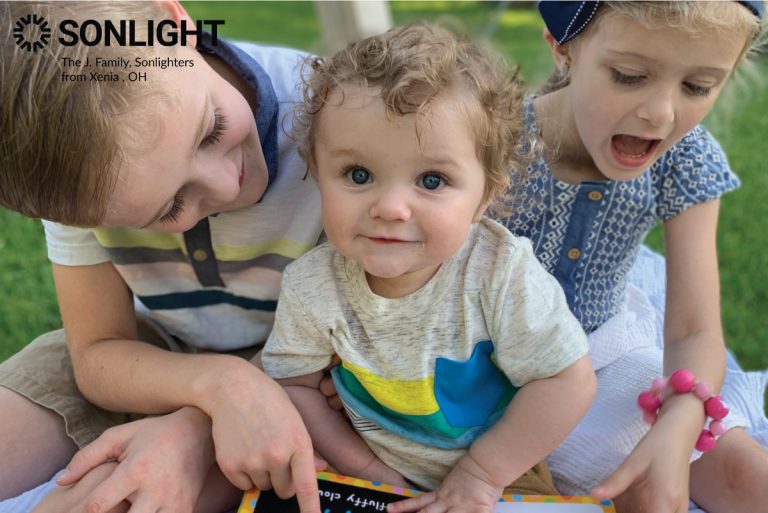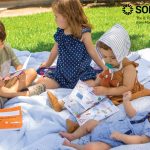Babies have an amazing ability to acquire language from 6 to 8 months. At that point, they are capable of learning any language. At 9 months, that ability almost magically turns off. They (usually) get stuck in one particular language, and that's the language they use for the rest of their lives.
Or at least, that's the research that Patricia Kuhl presents in a fascinating TED talk. She shares results from her extensive research in early language and brain development.
I suggest watching at least from minute 3:54 to 7:54.
Screens Are Not Ideal for Language Acquisition
One take-away from this video is that TV learning (screens, games, movies, etc.) does not work for young children. You can't put babies in front of a TV program or audio clip in a foreign language and expect them to learn.
It appears that TV programs in a baby's first language don't help either. For an interesting New York Times article about the popular Baby Einstein videos, click here.
What babies need instead of TV is to interact with someone face-to-face.
Babies learn the best from a live, human teacher. So please, please talk to your babies.
Expose Babies to Vocabulary by Communicating Naturally
Studies have shown that children who are raised in more robust language homes develop language skills better. Young children who have families who talk to them a lot develop vastly larger vocabularies than children whose parents don't talk to them as much.
The same goes for reading. Children whose parents (or older siblings) read to them develop vastly larger vocabularies than children who do not have anyone reading to them.
A large vocabulary helps children learn to read and communicate effectively.
As more studies emerge on childhood language acquisition, researchers see that it's not enough just to throw a barrage of words at your children. The best way to engage a baby—and we saw it somewhat in the above video where the baby is intently looking at the Mandarin-speaking woman—is to get your baby's attention and talk about what he or she is looking at. (This thought comes from Nurture Shock, a book that checks to discover if ideas we believe to be true are matched by the research.)
Back and Forth Interaction Is Key
We want to respond to a baby's babble and actions. So for example, if the baby is looking at the fan, you say, "Oh look, it's a fan. It's spinning." When a baby "talks," respond by letting the baby know you're listening, you're aware, you're connected with them. For example, when a baby coos, you say, "Oh, really?" They coo again, and you go, "That is so interesting." All of this (which most of us do normally) helps babies learn to speak more effectively.
For those of you have chosen to adopt, rest assured that additional research shows that most internationally-adopted children do ultimately catch up linguistically. And whether adopted or not, we can try to give children every advantage through being intentional with our communication.
Talk with Babies Even Before They Can Talk
How do we apply this to language acquisition? As you spend time with young children, talk about what they're looking at.
When my granddaughter, Natalia was a very small baby, she'd occasionally become fussy at my house. So I'd pick her up and we'd go around the room, looking at everything in the house. We'd stop and look at a picture. Oh, did you know your dad made that? That's a sunset; look at all the colors in the sky. She would stop fussing immediately and show amazing interest in what I was looking at.
And now that she's a bit older, she has an incredible vocabulary. We can never believe how many words she's come up with, and I think it's largely because her parents and family have put so many words into her by responding to her when she was quite young and beginning to speak.
Read to Babies Even Before they Understand Books
This is also where books come in. Though Natalia and I would look at everything in the house, my house couldn't introduce her to everything in the world around us. In books you can bring the world to life. For example, think about African animals. I certainly can't bring wildebeests into my home, but through books I can show different animals and talk about them.
With a book you can point (and thus draw your child's attention to the item): look, here's a wildebeest; this is a big herd of them. See, they're running through the African valley.
Our goal is to both increase our children's vocabulary and introduce them to our fascinating world. At times, I've stretched Natalia beyond her ability. She'll point to something and I'll go into a very detailed description of what it is and how it works, and she her eyes glaze over. I think, "Well, she wasn't ready." But I don't think my too-complex explanation has hurt her. I'll just bring it up again at a later point in time.
So to affirm what you probably already know by instinct: please talk to the babies in your life. Respond to them, coo to them, read to them, enjoy them. Watch in delight as they learn to speak! And be assured you're preparing them wonderfully for future learning.
When your babies are 3-4 years old, choose Sonlight's no-pressure preschool program for a delightful foundation to more learning.









